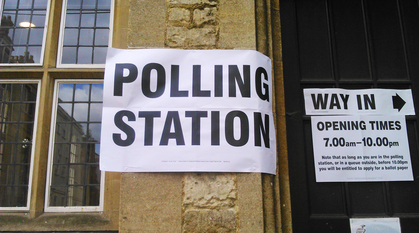4 ways to hold courageous conversations
Disagreement is in the air. Lisa Cumming offers four tips on how to disagree well.

From Brexit to how best to stop climate breakdown, there are lots of divisive issues about.
While there is no magic conflict resolution recipe that works in every context, we can choose how we respond. With that in mind, here are some ideas to play with.
1. Take it step by step
First up, a simple 'conflict cross code' for heated moments:
Stop – take a deep, slow breath to help you gather yourself so you can behave as you want to feel.
Look – at the context. What's happening? Are you safe? Who's involved?
Listen – to what is being said and listen within yourself to what you are hearing and how you are feeling about it.
Think – about whether you want or need to respond and if so how. Do you know the person you're in disagreement with and if so, what is your relationship to them?
In any conflict situation, if we pause we make choices about how to respond. We can choose to challenge, listen or avoid. At times, we may need to try a combination of all three.
2. Consider your boundaries
We all have lines that can't be crossed. There might be times when you feel the need to challenge a particular view or you see someone in need of active solidarity.
After the EU referendum results, for example, the UK saw a rise in hate crime. And the current flood of extremist views entering the mainstream continues. In such times, it's worth getting ideas about how to counter xenophobic or racist abuse. This short video, made by Penny Wangari-Jones of the Racial Justice Network, shares five ways to disrupt racism:
Pressing play on the video below will set a third-party cookie. Please see our cookies page to find out more.
Challenge might also feel necessary. Again, it can be useful to think about what type of arguments you might come across. And to be aware that we all have different responses to disagreement at different times.
Thinking about the sensitive subjects that might crop up in our daily lives – whether that's Brexit, responding to climate breakdown or who does the washing up – we can help equip ourselves to disagree better.
The practice of nonviolent communication (nvc) might be useful as it encourages us both to listen and express our needs. The basic sentence construction of nvc is:
- When ….
- I feel …
- Because I need …
- Would you be willing to …?
3. Become a radical listener
Listening – really listening – is a transformative thing to do. It's also one of the hardest.
Listening to someone doesn't mean we are agreeing with them. By listening, we can check our own assumptions, see the extent of the disagreement and perhaps find unexpected treasures of shared understanding.
The Quaker wisdom in Advices and queries 17 is incredibly valuable in this regard:
"Listen patiently and see the truth which other people's opinions may contain for you. Avoid hurtful criticism and provocative language… Think it possible that you may be mistaken."
– Advices and queries 17
4. Step back when you need to
Avoidance can lead to simmering tensions, sulking or passive aggressive behaviour. So when is avoiding confrontation the right thing to do?
When we've tried different approaches and patterns keep repeating. When the relationship matters more than expressing our opinion. When the situation feels (or is) unsafe. When we're tired. All of these are valid reasons to avoid confrontation.
We all have choices
We can all draw on own wisdom about what helps in a conflict situation and what doesn't. We know how it feels to be listened to and what happens when we aren't heard. We know how it feels when our lived experiences are not understood. We know what it feels like when something angers or hurts us too much to hear. We know what it feels like to be told we're wrong. And we know what it feels like to be anxious, confused, fearful or in danger.
In the current context of deep disagreement in the UK we all have choices to make about how to respond.
Challenging when needed, acting in solidarity when necessary – alongside looking for moments where we feel able to listen to understand why someone we disagree with thinks and feels as they do.


